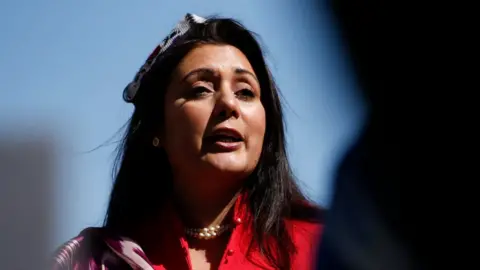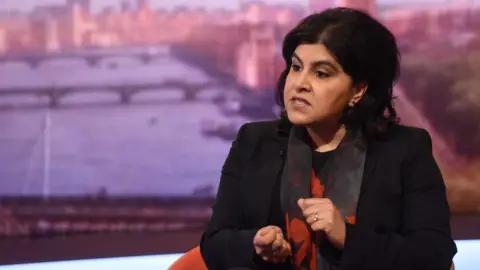Nusrat Ghani: Ex-minister's claims reignite rows over Tories and Islam
 Getty Images
Getty ImagesTory MP Nusrat Ghani's allegations have reignited a long-running row about the Conservative Party's approach to what's often called "Islamophobia".
Almost four years ago, the then-chairman of the Conservative Muslim Forum, Mohammed Amin, broke ranks and claimed the party was failing to take decisive action against anti-Muslim sentiment for fear of the political consequences.
He was later expelled from his role and joined the Lib Dems - but his was not the only critical voice.
Baroness Warsi, a former Tory party chair and cabinet minister, has spoken of being "ashamed" of her party's approach to what she's repeatedly described as institutional racism.
In the past few years, specific instances have been raised - one of the most high-profile being Boris Johnson's comments from 2018, in which he compared women wearing burkas to letterboxes or bank robbers.
There have also been a number of allegations about party representatives and members making discriminatory comments or sharing offensive material online.
But beyond the circumstances of any individual case, the wider question has been about the way the party has responded to such claims.
Critics say there's been an unwillingness within senior ranks to recognise the severity of the issue or to tackle it head on, which they claim has allowed anti-Muslim sentiment to go unchecked too often.
That's something the Conservative Party has consistently denied, saying it's always acted swiftly and decisively when allegations have been raised, and doesn't tolerate any prejudice or discrimination.
Singh inquiry
Last spring, an inquiry into the issue, established by Mr Johnson and led by academic Prof Swaran Singh, found there was discrimination and anti-Muslim sentiment within the Conservative Party, but claims of institutional racism were not borne out.
It did criticise the party's complaints process, and Prof Singh said it should make "uncomfortable reading".
Now the issue has come back to the fore - just as the party is already riven with internal struggles.
The severity of Nusrat Ghani's claim - that her Muslim faith was given as a reason for her sacking as a minister in 2020 - adds to the pressure piling on the prime minister at the start of what could be a pivotal week for his leadership.
Her accusations have been denied by the Chief Whip Mark Spencer, who said they were "completely false".

There were already questions about internal party management, specifically claims - denied by Downing Street - of undue pressure on MPs that amounted to intimidation, or threats to withdraw constituency funding.
Accusations and denials of the most serious nature are being heard in public, which only serves to highlight the deepening tensions within the Tory ranks.
The prime minister has said he takes Ms Ghani's claims "extremely seriously", and has ordered a Cabinet Office inquiry.
But already there are calls - including from the Muslim Council of Britain - for the Equality and Human Rights Commission to step in.
The watchdog says it will consider the findings from the Cabinet Office inquiry, and does not rule out using its legal powers if it is not satisfied with the party's progress towards implementing the recommendations arising from Prof Singh's review.
Some in the Conservative Party had hoped Prof Singh's investigation might have drawn a line under what has been a damaging issue; the report produced a series of recommendations that the party says its committed to delivering.
There are others who still believe there's been a failure to adequately address anti-Muslim sentiment from the top of the party down.
The latest allegations, which are now subject to an investigation, have once again shone a spotlight on the way the Conservative Party handles claims of Islamophobia, and it seems it's an issue that's far from resolved.
